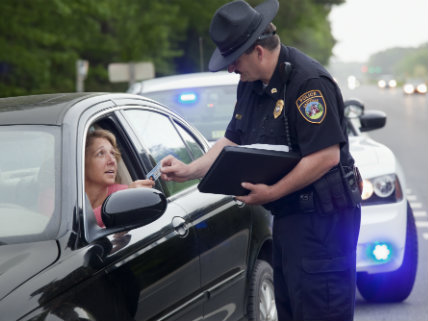Virginia Governor Proposes Ending License Suspensions for Unpaid Court Fines
Hundreds of thousands of Virginians have suspended licenses for unpaid court fines, according to a class-action lawsuit.

Virginia Gov. Terry McAuliffe says he wants to end the state's practice of automatically suspending driver's licenses for unpaid court fines and non-moving violations, which critics say trap hundreds of thousands of poor residents in a spiral of unemployment and debt.
As I reported last fall, there are more than 900,000 Virginians—about 11 percent of the state population—with suspended licenses, the majority of them for unpaid court fines. According to a Virginia DMV snapshot of data in 2015, 65 percent of outstanding suspensions were for failure to pay court debt, and roughly 38 percent of the suspension orders that year were due to unpaid court costs or fines unrelated to driving.
The Richmond Times-Dispatch reported Tuesday that McAuliffe will include a proposal to change the law in a larger criminal justice package he is releasing. The state is currently litigating a class-action lawsuit over the law by the Legal Aid Justice Center, a nonprofit advocacy group. The center argues the automatic license suspensions violate poor defendants' constitutional rights by failing to take into account whether they have the ability to pay the fines in the first place.
"That means that that factory worker from Floyd County whose job is 30 miles away in Christiansburg cannot lawfully drive to work and earn money to pay off those fines," McAuliffe said on Tuesday. "It makes no sense."
And if they choose to drive on a suspended license, they risk even more fines and possible jail time. The Legal Aid Justice Center welcomed the news of McAuliffe's plan.
"The coercive means of license suspension to collect fines and costs from people who can't afford to pay them is unconstitutional and unjustified," The Legal Aid Justice Center's Angela Ciolfi says in a statement to Reason. "We are pleased to see that this issue continues to have champions from both the left and right and hope the General Assembly will act aggressively on the proposals put forward by both Republican members and the Governor."
Virginia House Speaker William Howell told the Times-Dispatch the legislature will review the proposals.
"I am very sympathetic toward individuals who get trapped in a vicious cycle of having their license revoked, not being able to drive to work, losing their job, and not being able to pay off court costs," he said. "However, the General Assembly must be very careful as this issue is currently being litigated in court."
The Virginia Supreme Court quietly adopted new rules in November addressing many of the Legal Aid Justice Center's concerns, but the advocacy group argues the law as written remains unconstitutional.
In a brief filed in favor the Legal Aid Justice Center in November, the Justice Department also argued the practice is unconstitutional. "It is the position of the United States that the suspension of a person's driver's license in response to the failure to pay court debt without providing a person with adequate notice and a meaningful opportunity to be heard prior to the suspension constitutes a deprivation of a protected interest without due process in violation of the Fourteenth Amendment," the brief reads.
One of the lead plaintiffs in the Legal Aid Justice Center's lawsuit, Virginia resident Robert Taylor, 28, explained it to me in much more personal terms last fall.
"It's kind of like my feet are cut off," Taylor said. "I can't get anywhere. I want a job. I'll see a job, and when I find one I'm qualified for—I know I could run that store so well—but I can't get to it. Public transportation just isn't there. The bus will bring you in, but it won't take you back out. The only way to do it is to hopefully know someone who will give you a ride. So many of my friends have gotten traffic tickets that they've moved closer to town."
Editor's Note: As of February 29, 2024, commenting privileges on reason.com posts are limited to Reason Plus subscribers. Past commenters are grandfathered in for a temporary period. Subscribe here to preserve your ability to comment. Your Reason Plus subscription also gives you an ad-free version of reason.com, along with full access to the digital edition and archives of Reason magazine. We request that comments be civil and on-topic. We do not moderate or assume any responsibility for comments, which are owned by the readers who post them. Comments do not represent the views of reason.com or Reason Foundation. We reserve the right to delete any comment and ban commenters for any reason at any time. Comments may only be edited within 5 minutes of posting. Report abuses.
Please to post comments


Calendar 2018 with Holidays
February Calendar 2018
start your business with One Person Company registration